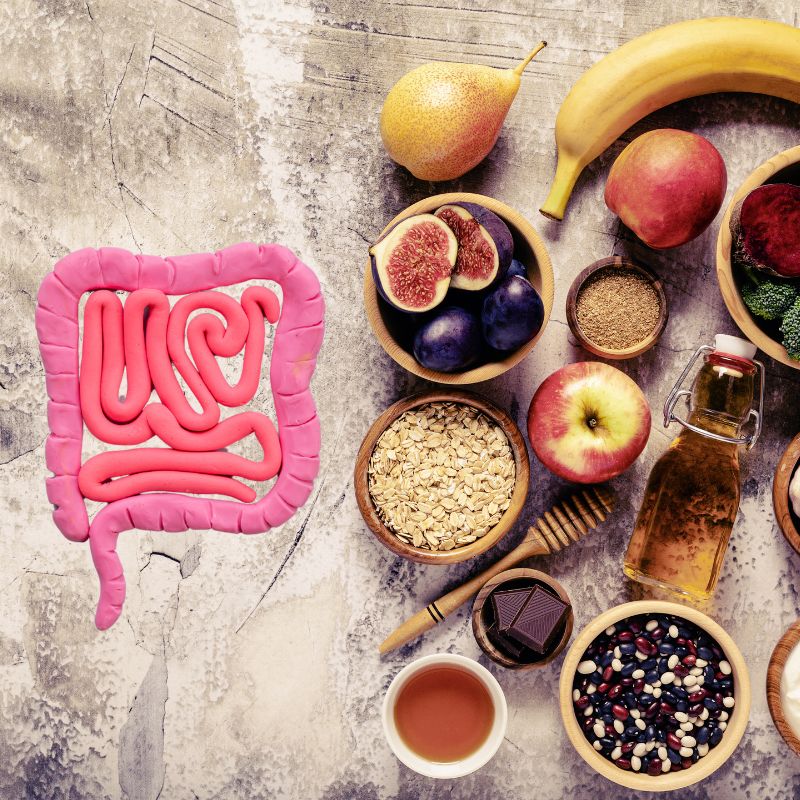
Cucumber & Tremella Granita
A Sicilian-style granita for hot days and hydrated cells When

Kick-start, energise, rejuvenate
All carefully planned and prepared to help nourish, reset and rejuvenate the body and mind.

Stress has long been recognized as a significant factor affecting overall health, but its impact on gut health is particularly profound. The gut, often referred to as the “second brain” is intricately connected to the brain through the gut-brain axis—a complex communication network linking emotional and cognitive centers of the brain with the gut. In this article, let’s do a deep dive into the gut-brain connection and discover why it’s essential for maintaining not just digestive health but also mental and emotional well-being.
The gut-brain axis is a complex communication system that links the gut and the brain, enabling them to influence each other in profound ways. This bidirectional communication means that not only can the brain affect gut function, but the gut can also send signals back to the brain, impacting mood, behaviour, and overall mental health.
This interaction is primarily mediated by the vagus nerve, the longest cranial nerve in the body, which acts as a direct communication pathway between the gut and the brain. The vagus nerve plays a crucial role in transmitting information about the state of the gut, such as the presence of inflammation or other disturbances.
Another key player in the gut-brain axis is the gut microbiome, the community of trillions of microorganisms residing in the digestive tract. According to Cleveland Clinic, your gut microbiome interacts with many of your bodily systems and assists with many of its functions. This is why a healthy gut microbiome is essential for maintaining a balanced gut-brain axis.

Need some herbal assistance? Learn about various Herbs For Cleansing Your Gut.
Stress has a profound impact on the gut, in large part due to the stress hormone cortisol, which plays a central role in disrupting normal digestive processes. When the body is under stress, cortisol levels rise, triggering the “fight or flight” response. This response diverts energy away from non-essential functions like digestion, leading to slowed or impaired digestive processes.
Cortisol can also decrease the production of stomach acid and digestive enzymes, making it harder for the body to break down and absorb nutrients. Additionally, elevated cortisol levels can alter the gut’s environment, leading to changes in the gut microbiome.
Chronic stress is particularly damaging to the gut microbiome. Prolonged exposure to stress can lead to dysbiosis, an imbalance in the various bacteria living in your body. This imbalance can manifest as a decrease in beneficial bacteria and an overgrowth of harmful bacteria, which can exacerbate digestive issues and contribute to a range of health problems.
According to the National Library of Medicine, dysbiosis has been linked to conditions such as irritable bowel syndrome (IBS), inflammatory bowel disease (IBD), and even cancer! The gut microbiome’s delicate balance is essential for maintaining gut health, and chronic stress can disrupt this balance, leading to long-term consequences.
The immune system is everything! Read this post on How To Boost Your Immune System.
Another significant way stress affects the gut is through what’s commonly referred to as Leaky Gut Syndrome. Under normal conditions, the gut lining acts as a barrier, selectively allowing nutrients to pass into the bloodstream while keeping harmful substances out. However, stress can weaken this barrier, making it more permeable. This allows toxins, bacteria, and undigested food particles to enter the bloodstream, which can trigger an immune response and inflammation throughout the body.
Stress also contributes to inflammation in the gut, which can further exacerbate digestive problems and impact overall health. When the gut becomes inflamed, it can disrupt normal digestive processes, leading to symptoms such as bloating, pain, and irregular bowel movements.
Furthermore, stress-induced inflammation can compromise the gut’s ability to function as an effective barrier, making it more susceptible to infections and other problems. The immune response triggered by this inflammation can spread beyond the gut and affect other parts of the body.
Ever heard of adaptogens? Learn about Adaptogens For Stress Reduction.
Stress can trigger or exacerbate various digestive issues, including irritable bowel syndrome (IBS), bloating, indigestion, and abdominal pain. These symptoms occur as stress disrupts normal digestive processes, slows down digestion, and alters gut awareness.
The gut-brain connection means that stress-related gut issues often coincide with psychological symptoms such as anxiety and depression. Imbalances in the gut microbiome can affect neurotransmitter production, leading to mood disturbances and heightened stress levels, creating a vicious cycle between gut and mental health.
The modern world is full of stress: That’s why you need to find out how to use Herbs For Stress!
Improving gut health under stress begins with dietary adjustments. Incorporating foods that promote gut health, such as prebiotics, probiotics, and fermented foods like yogurt, kimchi, and sauerkraut, can help restore the balance of beneficial bacteria in the gut.

Prebiotic fibers, found in foods like garlic, onions, and asparagus, feed these beneficial bacteria, supporting a healthy gut microbiome. Additionally, consuming foods rich in magnesium, such as leafy greens, nuts, and seeds, can help reduce stress levels. Omega-3 fatty acids, found in fatty fish like salmon and flaxseeds, are also known to support both gut and mental health, reducing inflammation and promoting a calm mind.
Managing stress effectively is crucial for maintaining gut health. According to Harvard Health Publishing, techniques such as mindfulness and meditation can help reduce stress and its impact on the gut.
Mindfulness involves staying present and fully engaging with the moment, which can help lower cortisol levels and improve digestive function. Meditation, particularly practices focused on deep breathing, can activate the parasympathetic nervous system, promoting relaxation and healthy digestion. Other stress-reducing practices, such as yoga and regular physical activity, can also play a significant role in supporting gut health.
Probiotics, particularly certain strains known as psychobiotics, can have a positive impact on mental health through the gut. Psychobiotics are specific probiotics that can influence the gut-brain axis, potentially reducing symptoms of anxiety and depression.
Lifestyle factors such as sleep, exercise, and hydration are essential for maintaining gut health under stress. Adequate sleep allows the body to repair and regenerate, which includes healing the gut lining. Regular exercise supports gut awareness and helps reduce stress, while staying hydrated ensures that the digestive system functions smoothly.
Looking for more on gut health? Check out this Podcast On Gut Health
Reference:

A Sicilian-style granita for hot days and hydrated cells When

Ashitaba (Angelica keiskei) is often described as a “longevity herb.”

In our modern wellness landscape, “biohacking” often evokes images of
Copyright Shoku Iku © 2024 | All Rights Reserved.
The statements on this website have not been evaluated by the TGA or FDA. These products are not intended to diagnose, treat, cure or prevent any disease.
Sign up to receive your discount.